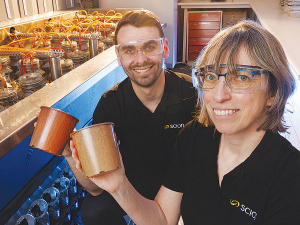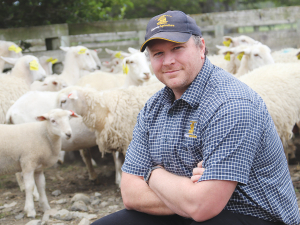"It's like winnning the lottery."
That's how a scientist from the Crown Research Institute Scion is describing their breakthrough in developing biodegradable nursery pots that will help nurseries and Kiwi gardeners reduce plastic waste and its impact on the environment.
The biodegradable pots, made from biopolymers and a biofiller, offer an alternative to the estimated 350 million plants in pots produced by NZ nurseries each year. The new product uses biopolymers made from sustainably grown sugarcane, cassava or corn. That is combined with a biofiller of waste organic matter.
Gerty Gielen, who heads Scions biodegradation testing facility, says the results are extraordinary.
“People have explored the idea of creating biodegradable plant pots for at least 10 years and many companies have given up along the way,” she told Hort News. “There are so many formula combinations and permutations, so to discover a formula that works feels like winning the lottery.”
The successful prototype, PolBionix, has been four years in development at Scion, as part of a project with commercial client Wilson and Ross Limited.
Director Peter Wilson engaged the services of Scion’s expert biomaterials and biodegradable testing team. The aim was to develop and test a formulation for a product that meets the requirements of a nursery, last at least 12 months above ground then, after it’s planted in soil, continues to biodegrade. The pot then provides fertiliser for the plant as it breaks down, supporting plant growth.
Polymer technologist Maxime Barbier developed various formulations in the project’s discovery phase, with product testing carried out in small batches. Early results were mixed. However, the team eventually developed a prototype that showed promising biodegradation properties in 2020.
Barbier says the research is a perfect example of Scion’s scientific focus in helping New Zealand transition to a circular bioeconomy and be less reliant on products made from fossil fuels.
“Importantly, the end result is products that can reduce plastic pollution in New Zealand and carbon emissions,” she says.
The biodegradable pots are currently being tested in three commercial nurseries. Auckland Council has also trialled the planting of 100 Pol- Bionix pots in Waitawa Regional Park. A further 100 pots were planted in August at Anchorage Park School as part of Auckland’s Eastern Busway Infrastructure project.
Raw material costs for PolBionix are higher than for traditional fossil-based plastic pots, so the pots will be more expensive. However, mitigating this is the costs saved by not having to add fertiliser, or face charges for disposing of the traditional pots in landfill. Planting should also be quicker, so there’s reduced labour costs for large-scale projects too.
In addition to significant private investment, funding support over the past four years of research has come from Callaghan Innovation, Auckland Council’s Waste Minimisation Fund and the Ministry for Primary Industries through its Sustainable Food and Fibre Futures fund.
Manufacturing of the pots will scale up after production processes are fine-tuned using funding received from the Government’s Plastics Innovation Fund. The pots are expected to be available by September 2023.


















